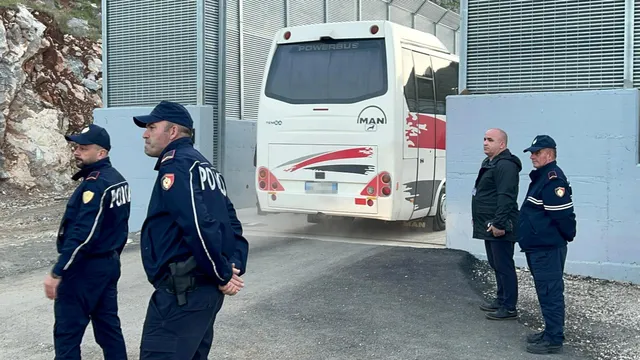On July 13, in the lobby of Rinas Airport, Marisel couldn't contain her joy: "We're free, we're free!" Just a few minutes earlier, this 40-year-old Filipina and her two colleagues, Analin and Rosalie, were about to be illegally deported from Albania, escorted by their employer and a police officer.
The trio, who had been working for a year at a tourist complex in Patok, had valid residence permits until August 23. However, upon their arrival, their employer confiscated their passports. With the tacit consent of the police, he forcibly directed them to the departure area, despite their desperate pleas: "We don't want to leave. We want to appeal. Give us back our passports." One of the police officers responded rudely: "Follow the boss. He is responsible for you."
Alerted by the women, journalists from BIRN followed up on the case and alerted the authorities. The deportation was halted at the last minute thanks to the intervention of a senior state police officer.
A widespread and tolerated practice
The case of Marisel, Analin, and Rosalie is not an isolated one. The Mary Ward Loreto Foundation has identified "at least 40 similar cases considered to be potential victims of trafficking," according to its representative Irena Kraya.
Employers confiscate documents, impose arbitrary fines, and force employees to work beyond the agreed hours, sometimes up to 18 hours a day. "The workers have neither rights nor freedom," Kray sums up.
The Albanian administration remains passive. The labor inspectorate claims it cannot intervene, and the police say they have not received any complaints—a claim refuted by the testimonies. "This reaction and disregard for the crime is repeated over and over again," says Kraia.
Marisel, Analin, and Rosalie signed a two-year contract as kitchen assistants for €400 a month. In reality, however, they cleaned, worked 12 hours or more a day, and received a total of around €700. The promised food was not provided.
"We even had to beg for fish heads for soup," says Rosalie. At the end of June, their employer tried to extend their stay on his own. When they refused, he demanded a fine of 430,000 leks – approximately their annual salary – for breach of contract. "The wages for the work done are unattainable," says Eljo Mucaj, director of the Labor Inspectorate, adding that only a court decision can impose compensation.
Illegal expulsions and withholding of documents
On July 12, their employer threatened to expel them. The police who were called did not respond, despite the employer's admission that he was holding their passports illegally.
The next day, the three women were forcibly taken to the airport – the first time they had seen their passports since arriving in Albania. Following a tip-off from BIRN, the police managed to stop the violation. An officer recorded the return of the documents, but no official report was filed.
The Albanian police reported only 11 expulsions of workers with permits for 2024. But according to Irena Kraja, "the police do not register cases where the employer sends them to the airport themselves."
"Employers behave as if they are masters of the workers' fate," she says. According to her foundation's preliminary report, abuses go far beyond passport retention: fraudulent hiring, work outside the contract, excessive hours, threats...
Lawyer Gentian Serrani sees this as a sign of "exploitation and forced labor, even hostage-taking." However, sanctions remain rare. Police chief Ilir Proda has promised an investigation: "No police officer involved in illegal activity will escape punishment." So far, however, the government has remained silent and the prime minister's office has not responded to questions.
Two days after their release, Marisel, Analin, and Rosalie found refuge in Tirana. They are looking for new jobs. One of them has already been hired at another tourist complex. But non-governmental organizations fear that this exploitative system, although temporarily exposed, will continue to operate behind the scenes. | BGNES

 Breaking news
Breaking news
 Europe
Europe
 Bulgaria
Bulgaria







